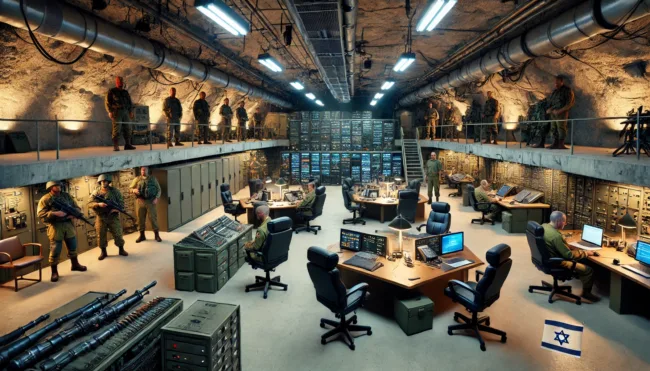Bracing for impact: Israel prepares underground bunkers amid looming Iran attack threat
Amid mounting tensions and threats of retaliation from Iran, Israel has made significant preparations, including the establishment of an underground bunker for senior leaders. US Secretary of State Antony Blinken has alerted G7 nations about the potential for an Iranian attack, with the situation intensifying by the day.
Heightened Concerns and Preparations
In a rapidly deteriorating situation, the United States has issued a stark warning regarding the potential for an Iranian attack on Israel. US Secretary of State Antony Blinken has alerted his counterparts in the G7 countries, cautioning that Iran might launch an assault on Israel as early as Monday, August 5, 2024. This warning follows a history of aggressive rhetoric from Tehran and is underscored by recent geopolitical developments in the region.
The White House has expressed concerns that Iran’s response could mirror or exceed the scale of the ballistic missile and drone attacks launched against Israel on April 13. With the possibility that other adversaries of Israel might join forces, the situation could escalate into a broader regional conflict. This apprehension is compounded by statements from Iranian Supreme Leader Ayatollah Ali Khamenei, who has vowed to retaliate against Israel following the killing of Hamas chief Ismail Haniyeh. Khamenei described the attack on Haniyeh as a grievous act that demands revenge, referring to it as a “duty” to avenge the bloodshed.

Israel is preparing for a potential Iranian attack amid escalating tensions, with US diplomatic efforts to prevent a full-scale conflict.
International Response and G7 Statement
In response to these mounting tensions, the G7 nations have issued a joint statement expressing grave concern over the heightened threat of conflict in the Middle East. The statement urges all parties involved to avoid exacerbating the current cycle of violence and to engage in constructive dialogue to de-escalate the situation. The G7’s plea highlights the global apprehension regarding the potential for widespread conflict in an already volatile region.
Israeli Preparations and Security Measures
In anticipation of a potential escalation, Israel has reportedly made extensive preparations to safeguard its leadership. According to a report from the Times of Israel, an underground bunker has been prepared by Shin Bet, Israel’s internal security service, to provide a secure location for senior leaders, including Prime Minister Benjamin Netanyahu, during times of heightened threat. This move reflects the severity of the current security situation and Israel’s commitment to ensuring the safety of its top officials.
Israel has also ramped up its military readiness, with the Israel Defense Forces (IDF) conducting large-scale drills to simulate responses to various attack scenarios. These exercises are designed to enhance the IDF’s preparedness for a potential multifront conflict, including threats from Hezbollah in Lebanon and other militant groups in Gaza.
Diplomatic Efforts and Future Prospects
Antony Blinken has arranged a conference call with G7 nations to apply last-minute diplomatic pressure on Iran and Hezbollah, aiming to mitigate the risk of a full-scale war. These efforts are part of a broader strategy to de-escalate the situation and prevent further violence.
Blinken’s diplomatic push is complemented by ongoing discussions with key Middle Eastern allies, including Saudi Arabia and the UAE, to foster a united front against Iranian aggression. The US is also coordinating with the European Union to reinforce diplomatic channels and promote dialogue between Israel and its neighbors.
Expert Opinion: Regional Implications and Future Risks
Experts suggest that the ongoing crisis highlights the fragile nature of regional stability in the Middle East. The potential for a large-scale conflict underscores the need for robust diplomatic efforts and international cooperation to manage tensions and prevent further escalation. The involvement of multiple actors and the historical context of regional disputes add layers of complexity to the current situation.
Political analysts warn that the crisis could have far-reaching consequences, including disruptions to global oil supplies and increased refugee flows. The international community is urged to act swiftly to prevent a humanitarian catastrophe and to support efforts aimed at achieving a long-term resolution to the conflict.
Human rights organizations have expressed concern over the potential for civilian casualties and the impact of prolonged conflict on vulnerable populations. They call for all parties to adhere to international humanitarian law and to prioritize the protection of civilians.
The Middle East is on the brink of a potentially devastating conflict, with Israel and Iran at the center of escalating tensions. The international community’s response, spearheaded by US diplomatic efforts, will be crucial in determining whether the region can avoid a full-scale war. As Israel prepares for the worst, the need for dialogue and de-escalation has never been more urgent.
Discover more from Business-News-Today.com
Subscribe to get the latest posts sent to your email.

